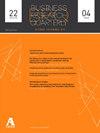Window dressing in the Active Share scores in publicly reported portfolios
IF 3.4
4区 管理学
Q2 BUSINESS
引用次数: 0
Abstract
Using a unique database that includes publicly disclosed fund holdings at the end of the quarter as well as the holdings in all non-publicly disclosed months, we found that some funds could alter their portfolios in publicly disclosed months to artificially increase their Active Share scores and consequently appear more active and take advantage of the positive relationship between Active Share and money flows. We show how, consistent with non-informed trades, these funds erode their future performance. However, these funds reach their objective of increasing future money flows. Moreover, we find that window-dresser funds can be identified by controlling the level of tracking error. The funds with high Active Share scores and low tracking errors have the highest levels of Active Share window dressing and the worst future returns. However, compared with less active funds, they are able to capture higher money flows. JEL CLASSIFICATION G23; G11在公开报告的投资组合中,活跃股票得分的粉饰
使用一个独特的数据库,包括季度末公开披露的基金持有量以及所有非公开披露月份的持有量,我们发现一些基金可以在公开披露的月份改变他们的投资组合,人为地增加他们的活跃股得分,从而显得更加活跃,并利用活跃股与资金流之间的正相关关系。我们展示了与不知情的交易一样,这些基金如何侵蚀它们未来的表现。然而,这些基金达到了增加未来资金流动的目标。此外,我们发现可以通过控制跟踪误差的程度来识别橱窗资金。活跃股得分高、跟踪误差低的基金,其“活跃股”粉饰账目的水平最高,未来回报也最差。然而,与不太活跃的基金相比,它们能够获得更高的资金流。凝胶分类g23;为G11
本文章由计算机程序翻译,如有差异,请以英文原文为准。
求助全文
约1分钟内获得全文
求助全文

 求助内容:
求助内容: 应助结果提醒方式:
应助结果提醒方式:


